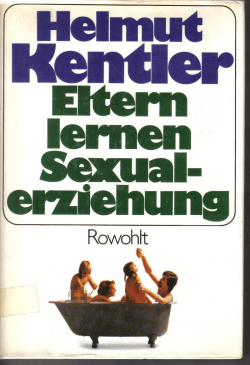One of our staff members is contributing considerably to a News Archiving service at Mu. Any well educated (Masters, PhD or above) users who wish to make comments on news sites, please contact Jim Burton directly rather than using this list, and we can work on maximising view count.
Helmut Kentler: Difference between revisions
The Admins (talk | contribs) No edit summary |
The Admins (talk | contribs) No edit summary |
||
| Line 1: | Line 1: | ||
[[File:Kentler.jpg|thumb|250px|left|Helmut Kentler]]{{Template:Ac}} | —[[File:Kentler.jpg|thumb|250px|left|Helmut Kentler]]{{Template:Ac}} | ||
__NOTOC__'''Helmut Kentler''' (2 July 1928 in Cologne – 9 July 2008 in Hannover) was a German Psychologist, sex education expert, court-appointed specialist and professor of social education at the University of Hannover. Kentler pursued an Emancipationist Philosophy with regards to youth, but among his greatest and most contentious achievements was his work with the disadvantaged, particularly delinquent male youth and their carers. From 1979 to 1982 he was president of the German Society for Social-Scientific Sexual Research, later he was on the advisory board of the ''Humanistische Union''. He was also a member of the ''Deutsche Gesellschaft für Sexualforschung''. | __NOTOC__'''Helmut Kentler''' (2 July 1928 in Cologne – 9 July 2008 in Hannover) was a German Psychologist, sex education expert, court-appointed specialist and professor of social education at the University of Hannover. Kentler pursued an Emancipationist Philosophy with regards to youth, but among his greatest and most contentious achievements was his work with the disadvantaged, particularly delinquent male youth and their carers. From 1979 to 1982 he was president of the German Society for Social-Scientific Sexual Research, later he was on the advisory board of the ''Humanistische Union''. He was also a member of the ''Deutsche Gesellschaft für Sexualforschung''. | ||
| Line 12: | Line 12: | ||
===View of [[pederasty]]=== | ===View of [[pederasty]]=== | ||
<blockquote> | <blockquote>[...] ''I have ''[...]'' in the vast majority of cases made the experience that pederastic conditions can have a very positive effect on the personality development of a boy, especially if the pederast is a real mentor of the boy.'' (Helmut Kentler, 1999)</blockquote> | ||
<blockquote>''In 1981, Kentler was invited to the German parliament to speak about why homosexuality should be decriminalized—it didn’t happen for thirteen more years—but he strayed, unprompted, into a discussion of his experiment. “We looked after and advised these relationships very intensively,” he said. He held consultations with the foster fathers and their sons, many of whom had been so neglected that they had never learned to read or write. “These people only put up with these feeble-minded boys because they were in love with them,” he told the lawmakers.'' (from the ''New Yorker'')</blockquote> | <blockquote>''In 1981, Kentler was invited to the German parliament to speak about why homosexuality should be decriminalized—it didn’t happen for thirteen more years—but he strayed, unprompted, into a discussion of his experiment. “We looked after and advised these relationships very intensively,” he said. He held consultations with the foster fathers and their sons, many of whom had been so neglected that they had never learned to read or write. “These people only put up with these feeble-minded boys because they were in love with them,” he told the lawmakers.'' (from the ''New Yorker'')</blockquote> | ||
| Line 41: | Line 41: | ||
*Jan Feddersen praised Kentler in an obituary in the Tageszeitung of 12 July 2008, as a "meritorious fighter for a permissive sexual morality"<ref>http://www.taz.de/1/archiv/digitaz/artikel/?ressort=tz&dig=2008/07/12/a0152</ref> | *Jan Feddersen praised Kentler in an obituary in the Tageszeitung of 12 July 2008, as a "meritorious fighter for a permissive sexual morality"<ref>http://www.taz.de/1/archiv/digitaz/artikel/?ressort=tz&dig=2008/07/12/a0152</ref> | ||
*Some protestant church authorities expressed a similar opinion. In an obituary, the Study Centre for Protestant Youth Work pointed out Kentler's controversial positions, but also acknowledged his work for "institutional structure and professional socialisation" and the attempts to make homosexuality socially acceptable in the church. | *Some protestant church authorities expressed a similar opinion. In an obituary, the Study Centre for Protestant Youth Work pointed out Kentler's controversial positions, but also acknowledged his work for "institutional structure and professional socialisation" and the attempts to make homosexuality socially acceptable in the church. | ||
*The Humanist Union pays positive tribute to Kentler's person and body of work. In his obituary it says: "A lighthouse of our advisory board has gone out. Like no other, Helmut Kentler embodied the humanistic task of an enlightened sex education, and he was also a role model for public science. (...) His habitus combined the qualities of competence, authenticity and closeness in a rare way, with which Kentler impressed his readers and listeners alike ... Since he immediately aroused sympathies, many have confided in him."<ref name=Lautmann>[http://www.humanistische-union.de/publikationen/mitteilungen/hefte/nummer/nummer_detail/back/mitteilungen-202/article/nachruf-auf-helmut-kentler/ Rudiger Lautmann - Obit for Humanistische Union]</ref> | *The Humanist Union pays positive tribute to Kentler's person and body of work. In his obituary it says: ''"A lighthouse of our advisory board has gone out. Like no other, Helmut Kentler embodied the humanistic task of an enlightened sex education, and he was also a role model for public science. ''(...)'' His habitus combined the qualities of competence, authenticity and closeness in a rare way, with which Kentler impressed his readers and listeners alike ... Since he immediately aroused sympathies, many have confided in him."''<ref name=Lautmann>[http://www.humanistische-union.de/publikationen/mitteilungen/hefte/nummer/nummer_detail/back/mitteilungen-202/article/nachruf-auf-helmut-kentler/ Rudiger Lautmann - Obit for Humanistische Union]</ref> | ||
==External links== | ==External links== | ||
Revision as of 19:56, 11 April 2023
—

Helmut Kentler (2 July 1928 in Cologne – 9 July 2008 in Hannover) was a German Psychologist, sex education expert, court-appointed specialist and professor of social education at the University of Hannover. Kentler pursued an Emancipationist Philosophy with regards to youth, but among his greatest and most contentious achievements was his work with the disadvantaged, particularly delinquent male youth and their carers. From 1979 to 1982 he was president of the German Society for Social-Scientific Sexual Research, later he was on the advisory board of the Humanistische Union. He was also a member of the Deutsche Gesellschaft für Sexualforschung.
Kentler was for a period, a high-profile courtroom expert in the "Squealer Assassin" mold of American defense experts Ralph Underwager and Elizabeth Loftus. Indeed, in 1999, he had planned an (as yet) unpublished book on this topic, in which he details 35 cases in which he believed strongly that the accused were innocent.[1]
Since his death, Kentler's work has been defamed in a campaign of posthumous and political/opportunistic systemic legacy harassment. A number of highly sensational media hit pieces, laden with emotionalism and capitalized upon by right wing (AfD) political interests have ensued. Two men have since testified against Kentler after receiving legal aid from the party, and were handsomely compensated by the State of Berlin as a result.[2]
Emancipatory ideology
For Helmut Kentler, theory and practice were tightly knit throughout his life. His development of a theory of emancipatory youth work grew out of his work with adolescents and young adults during his studies and the five years he spent working in church educational institutions. He implemented group pedagogy and team work as trusting and respectful cooperation between educators with different professional competence, and attempted to gain insight into the psychological and social connection between learning and emancipation. During the student riots in Berlin, Kentler was temporarily active as a "psychological consultant for police issues".[3] The sexual liberation movement of Berlin students in communities and shared flats resulted in his advocacy of an emancipatory sexual education in the home,[4] which was also scientifically reflected in his dissertation in 1975 and made him an expert in sex education for the rest of his professional life. Kentler sometimes makes reference to influential sexual liberation theorists such as Wilhelm Reich and Herbert Marcuse.[5]
View of pederasty
[...] I have [...] in the vast majority of cases made the experience that pederastic conditions can have a very positive effect on the personality development of a boy, especially if the pederast is a real mentor of the boy. (Helmut Kentler, 1999)
In 1981, Kentler was invited to the German parliament to speak about why homosexuality should be decriminalized—it didn’t happen for thirteen more years—but he strayed, unprompted, into a discussion of his experiment. “We looked after and advised these relationships very intensively,” he said. He held consultations with the foster fathers and their sons, many of whom had been so neglected that they had never learned to read or write. “These people only put up with these feeble-minded boys because they were in love with them,” he told the lawmakers. (from the New Yorker)

Intergenerational sex
In Kentler's view, it was not enough for parents to avoid putting obstacles in the way of their children's sexual desires; rather, parents should introduce their children to sexuality, because otherwise they "risk leaving them sexually underdeveloped, becoming sexual cripples".[6] Early experiences of coitus are useful, because teenagers with coitus experience "demand an independent world of teenagers and more often reject the norms of adults".[7] Kentler warned the parents against being concerned over rape or molestation of children by adults: "The wrong thing to do now would be for parents to lose their nerve, panic and run straight to the police. If the adult had been considerate and tender, the child could even have enjoyed sexual contact with him".[8] "If such relationships are not discriminated against by the environment, then the more the older one feels responsible for the younger one, the more positive consequences for personality development can be expected", he wrote in 1974 in his foreword to the controversial sex education book, Zeig mal![9] (En: "Show Me!", documented in full at BoyWiki.[10])
Some sources such as the New Yorker claim that Kentler disowned his views on intergenerational sex in the early 90s following the suicide of an adoptive son he was said to have claimed was abused by his birth mother. It was unclear to what extent this would have been political (at the time, moral panic was at its highest in Germany), but his 1999 opinion on pederasty above appears to conflict with this, as does Rudiger Lautmann's obituary.[1] The worst of the harassment against his legacy took place long after his withdrawal from the debate on intergenerational sexuality, and death.
Famous study
At the end of the 1960s, in a model experiment, he placed several delinquent 13 to 15-year-old boys, whom he considered "secondary mental defectives", with pederasts he knew - in order to contribute towards their socialization as productive adults. These studies (whose scale is unknown) were conducted in Berlin with the support of the Youth Welfare Office. Kentler did not hide the fact that he placed young people with pederasts he knew. He reported about it in his book Leihväter from 1989. He also maintained contacts with the former participants during his teaching activities in Hanover and, in an expert opinion for the Berlin Family Court in the early 1990s, recommended that one of the youths continue to stay with his pederastic foster father, whom he described as a pedagogical natural talent.[11]
Data and findings
Call for input!
|
Little is known about the data and findings of Kentler's work, due to a lack of translation and possible state involvement in a cover-up. As to the sample size, Teresa Nentwig, a state-appointed social scientist discussed later on in this article stated “we don’t know”, explaining that city archivists blocked access to crucial data.[12] According to her investigation, “the Senate also ran foster homes or shared flats for young Berliners with pedophile men in other parts of West Germany.”
Kentler claims the results of his study to have been a "complete success"[13]
Harassment
After the magazine Emma had reported on his activities in 1993, Kentler was shouted down by feminist activists at an event in Hannover, receiving a punch in the face from an attendee.[14] Due to the journalistic work by Ursula Enders, he was prevented from receiving the Magnus Hirschfeld Prize in 1997 "at the last minute".
Kentler's study was again publicly debated in 2015, when the Senate Youth Administration commissioned the political scientist Teresa Nentwig from the University of Göttingen to investigate it and forward her findings to the relevant authorities. Predictably, the Berlin Senator for Education Sandra Scheeres called the "experiment" at that time a "crime in state responsibility". In 2017/18, Nentwig was further commissioned in Lower Saxony to research the "effects" of Kentler's activities. Nentwig did not dismiss the possibility that Kentler himself was involved in the "abuse", despite there being no evidence or accusers. Hannover University then disowned any credit to Kentler's research after a series of politically-motivated investigations. At this point, a representative of the far-right AfD party contacted one of the participants in the study and a lawsuit against the State of Berlin was drawn up involving two former boys. According to the New Yorker, for around two years, the AfD made political capital out of this at their events. On 15 June 2020, a report prepared by social scientists entitled "Helmut Kentler's Work in Berlin Child and Youth Services" was presented in Berlin. The Berlin Senator for Education Sandra Scheeres promised those effected by the "abuse" financial compensation by the State of Berlin.[15] The men accepted this compensation.
Praise
- Jan Feddersen praised Kentler in an obituary in the Tageszeitung of 12 July 2008, as a "meritorious fighter for a permissive sexual morality"[16]
- Some protestant church authorities expressed a similar opinion. In an obituary, the Study Centre for Protestant Youth Work pointed out Kentler's controversial positions, but also acknowledged his work for "institutional structure and professional socialisation" and the attempts to make homosexuality socially acceptable in the church.
- The Humanist Union pays positive tribute to Kentler's person and body of work. In his obituary it says: "A lighthouse of our advisory board has gone out. Like no other, Helmut Kentler embodied the humanistic task of an enlightened sex education, and he was also a role model for public science. (...) His habitus combined the qualities of competence, authenticity and closeness in a rare way, with which Kentler impressed his readers and listeners alike ... Since he immediately aroused sympathies, many have confided in him."[1]
External links
- American Conservative - Full New Yorker article currently behind paywall, but copied here and archive.
- Wikipedia
References
- ↑ 1.0 1.1 1.2 Rudiger Lautmann - Obit for Humanistische Union
- ↑ Teller Report: Compensation Award
- ↑ Spiegel - Feind im Innern
- ↑ Parents learn sexual education, Rowohlt, 1975
- ↑ Herbert MARCUSE: Liberation of Sexuality. In: Helmut Kentler (ed.): Sexualwesen Mensch. Texte zur Erforschung der Sexualitat (Munich: Piper 1988) pp. 222-233; Show Me! discusses Reich.
- ↑ "Parents learn sexual education", S. 32
- ↑ H. Kentler: "Sex education". 1970, p. 179
- ↑ Parents learn sexual education, pp. 103 f.
- ↑ Zeig mal! Wuppertal 1974, foreword
- ↑ BoyWiki: Show Me!, including foreword by Helmut Kentler
- ↑ http://www.haz.de/Hannover/Aus-der-Stadt/Uebersicht/Hannover-Sexualwissenschaftler-Helmut-Kentler-bringt-Pflegekinder-bei-Paedophilen-unter
- ↑ Irish times: Nentwig's investigation
- ↑ TAZ.de - Kentler's claims
- ↑ http://www.haz.de/Hannover/Aus-der-Stadt/Uebersicht/Hannover-Sexualwissenschaftler-Helmut-Kentler-bringt-Pflegekinder-bei-Paedophilen-unter
- ↑ https://www.morgenpost.de/berlin/article229319400/Berlin-entschaedigt-Missbrauchsopfer.html
- ↑ http://www.taz.de/1/archiv/digitaz/artikel/?ressort=tz&dig=2008/07/12/a0152
- Official Encyclopedia
- Censorship
- Sociological Theory
- Hysteria
- Religion
- Youth
- Research
- Research into effects on Children
- People
- People: German
- People: Deceased
- People: Academics
- Law/Crime
- Law/Crime: German
- History & Events: German
- History & Events: 1960s
- History & Events: 1970s
- History & Events: 1980s
- History & Events: 1990s
- History & Events: 2010s
- History & Events: Real Crime
- History & Events: Personal Scandals
- Research: Children's Sexuality
- History & Events: Moral controversies
